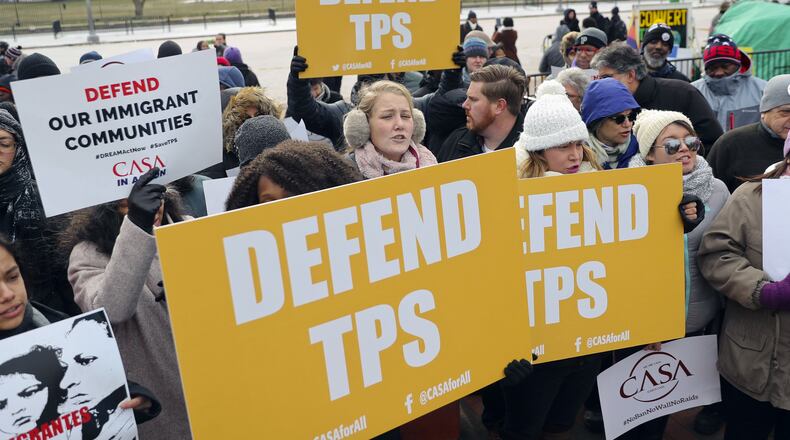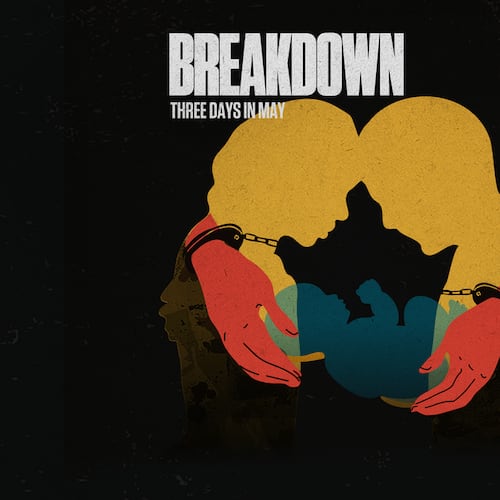José Fermán sat in the Atlanta offices of the El Salvadoran consulate, overwhelmed with a sense of pressure, sadness and fear. All playing out on his tear-stained face.
He has been in the United States since 1999.
“I’ve been living in the country all that time. We’ve worked, we’ve helped the country,” Fermán said. “We are Hispanics who come here to work and better ourselves, unlike others who come here to cause problems. Because of them, we end up paying the price.”
He starts to cry.
Last week was an extraordinary moment in the long and intense fight over immigration in this country. It began with the the roiling debate in Washington over the “Dreamers” and ended with President Donald Trump being accused of deriding “shithole countries” whose citizens emigrate to the United States. In between were nationwide immigration raids on 7-Eleven stores — and word that the administration was canceling “temporary protective status” that has enabled more than 200,000 Salvadorans to live and work in this country for years.
So José Fermán and many of his countrymen find themselves likely to be forced out once the “TPS” program expires in September 2019.
The Dreamers, who are young unauthorized immigrants who were mostly brought here by their parents, could face their own deportations as early as March if they are not granted legal status.
» Sen. Perdue doesn't recall Trump's comments
In September 2016, the Obama administration, convinced that El Salvador would not be able to absorb the return of so many citizens because the country was still suffering the devastating effects of the 2001 earthquakes, as well as drought, poverty and gang violence, extended the TPS program an additional 18 months.
» Trump denies using vulgar language
Experts maintain that a massive deportation of nearly 200,000 Salvadorans who currently reside in the U.S. could pose a humanitarian crisis for the Central American nation.
“Our country is not prepared to receive thousands of Salvadorans,” said Cesar Ríos, of the non-profit Salvadoran Immigrant Institute. “A massive deportation would be a huge blow to the country’s economy, a serious blow to families. This would cause a humanitarian crisis.”
Department of Homeland Security (DHS) Secretary Kirstjen Nielsen said the damage caused by the earthquakes does not justify another TPS renewal.
A statement issued by DHS last week said: “The original conditions caused by the 2001 earthquakes no longer exist. Thus, under the applicable statute, the current TPS designation must be terminated.”
» Trump's approval ratings decline in Georgia
El Salvador received substantial international help and the nation’s infrastructure had in large part already been rebuilt, Nielsen said.
Atlanta’s Salvadoran Consul General Lucía Ventura called for the community to remain calm, although at least 5,000 Salvadorans in Georgia could be affected by the TPS decision.
“We feel the impact of this decision. It affects many of our families who have lived here for years,” Ventura said. “But I urge you to remain calm and to make decisions in a calm manner. Visit our consulate. Get educated and informed, and obtain the correct documentation.”
The United States established the TPS program in 1990 under President George H.W. Bush to offer refuge to people fleeing earthquakes, flooding, hurricanes, war and other disasters in their home countries. The program currently protects about 320,000 people from 10 countries.
With 200,000-plus people living in the United States, Salvadoran immigrants here are the largest group of foreigners benefiting from TPS. Many arrived after earthquakes in 2001 killed more than 1,000 people and destroyed thousands of homes. Others streamed in between 1980 and 1992, when thousands of people fled El Salvador’s civil war.
In 2017, Nicaraguans and more than 45,000 Haitians, who had arrived after the 2010 earthquake, also lost their protective status.
As the Obama administration did in 2016, the secretary of Homeland Security may renew protections, which include work permits, for up to 18 months at a time. But critics of TPS argue that many people who benefit from it are overstaying their welcome in the country. Fewer than 100,000 people would remain in the program if the U.S. expels people from El Salvador, Haiti and Nicaragua.
Trump has also targeted the notorious MS-13 gang in his immigration fight. Born in Los Angeles in the 1980s under the creed “rape, kill, control,” MS-13 quickly spread throughout the United States, often operating in Central American immigrant communities with members from El Salvador, Guatemala, Honduras and Mexico.
» Trump says no to immigration deal
According to the FBI, by 2010, MS-13 had about 10,000 members in North America. In metro Atlanta, gang members settled mostly in Gwinnett and DeKalb counties, according to investigators.
In March 2010, 26 alleged MS-13 members in DeKalb and Gwinnett were indicted on racketeering charges, which included seven homicides. Most of the gang members were in the U.S. illegally, according to federal prosecutors.
Four local MS-13 gang leaders were convicted for their roles in a murder and racketeering spree dating back to 2006, the FBI said. In October 2006, 19-year-old Lal Ko was shot and killed execution-style in Gwinnett because MS-13 members believed Ko had told police about the gang’s activity, according to prosecutors.
In 2014, a multi-agency investigation that spanned several years ended with the sentencing of several MS-13 leaders, according to James Hurley, supervisor of the FBI’s Safe Streets Gang Task Force.
“Those convictions had a significant impact by neutralizing MS-13 operations in the Atlanta area,” Hurley said in an emailed statement.
Gang investigators with the Gwinnett and DeKalb county police departments said Wednesday that the MS-13 presence has diminished.
“We rarely run into them,” Gwinnett police Sgt. Marco Silva said. “We don’t see them much anymore.”
Silva, a 25-year veteran of the Gwinnett police department, is a supervisor in the gang unit. In the early 90s, gangs were nearly non-existent in the county. But by the end of the decade, the county demographics began to change, and the number of Hispanic gangs surged, Silva said.
“Then when the economy tanked on us, a lot of the Hispanics left because there was no work,” Silva said. “Now that there’s more work, they’re starting to come back.”
Many gang crimes may not be reported at all, such as when a Latino gang targets other Latinos, according to a DeKalb gang investigator who asked not to be identified. If the victims themselves are in the country illegally, they often fear getting deported if they report a crime, she said.
“If you’re a victim, it has nothing to do with if you’re here legally or illegally,” Silva said.
About the Author
Keep Reading
The Latest
Featured






